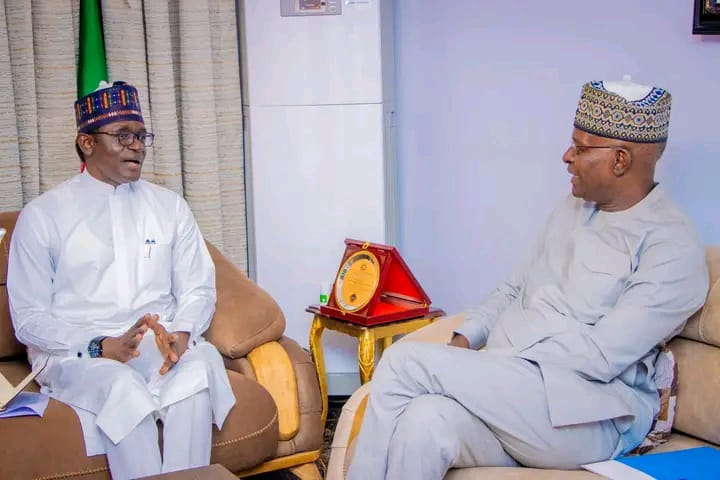By Mala Abdulazeez
Yobe State Governor and Chairman of the Lake Chad Basin Governors’ Forum, Mai Mala Buni, has met with the United Nations Humanitarian Coordinator to Nigeria, Mohamed Malick Fall, to explore ways to strengthen developmental partnerships and transition from humanitarian aid to long-term resilience and development in the region.
The high-level meeting focused on the implementation of the State Action Plan (SAP) on Durable Solutions to Internal Displacements, a strategic initiative aimed at addressing the challenges of displaced persons through sustainable interventions in education, healthcare, livelihoods, governance, peace-building, and climate resilience.
In a statement issued by his Director-General for Press and Media Affairs, Mamman Mohammed, Governor Buni highlighted the successes recorded through collaboration with the UN and other partners. He reiterated his administration’s strong commitment to ensuring the ownership of durable solutions by the state, adopting a people-centered and inclusive approach that gives both displaced persons and host communities an active role in decision-making and implementation processes.
The governor further revealed that Yobe State had, in the past three years, allocated 5% of its annual budget to durable solutions. In 2025, this commitment was significantly increased to 24.9%, demonstrating the state’s readiness to align with the UN Action Agenda on Durable Solutions.
Congratulating Governor Buni on the successful hosting of the 5th Lake Chad Basin Governors’ Forum (LCBGF), UN Humanitarian Coordinator Mohamed Malick Fall commended Yobe State for its leadership and organizational capabilities in implementing the SAP. He described Yobe’s progress as a reference model that could be scaled and adapted to other regions facing similar challenges.
“While Yobe State has already recorded commendable success in piloting durable solutions, it is now time to consolidate these gains and move towards full-scale implementation,” Fall stated.
He also reaffirmed the UN’s commitment to mobilizing additional technical and financial resources to support Yobe State in achieving its durable solutions agenda.
The meeting also highlighted the crucial role of the Security Planning and Coordination Group (SPCG) in ensuring a safe, voluntary, and dignified process for the return, local integration, or relocation of displaced persons.
With the reinforced collaboration between Yobe State and the UN, stakeholders remain optimistic that these durable solutions will create lasting stability and progress for communities affected by displacement in the Lake Chad Basin.
